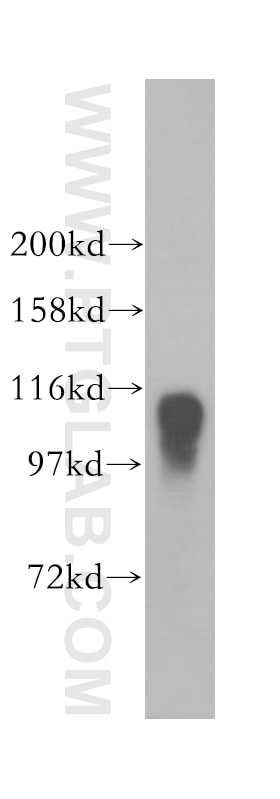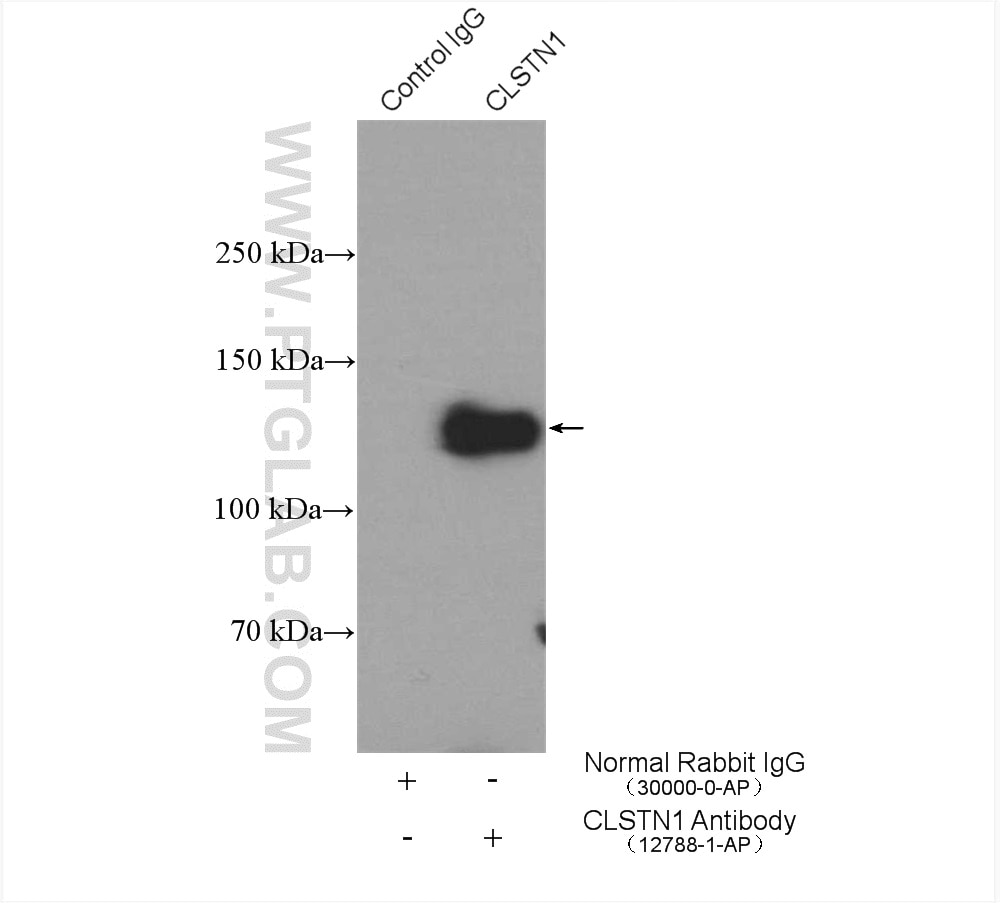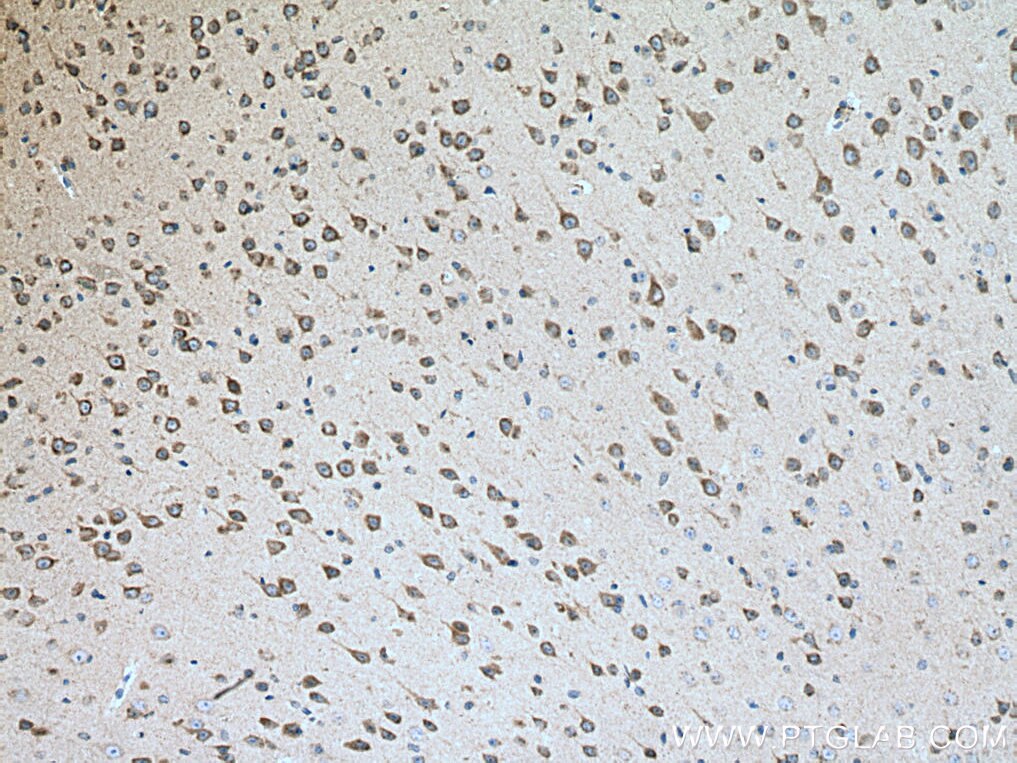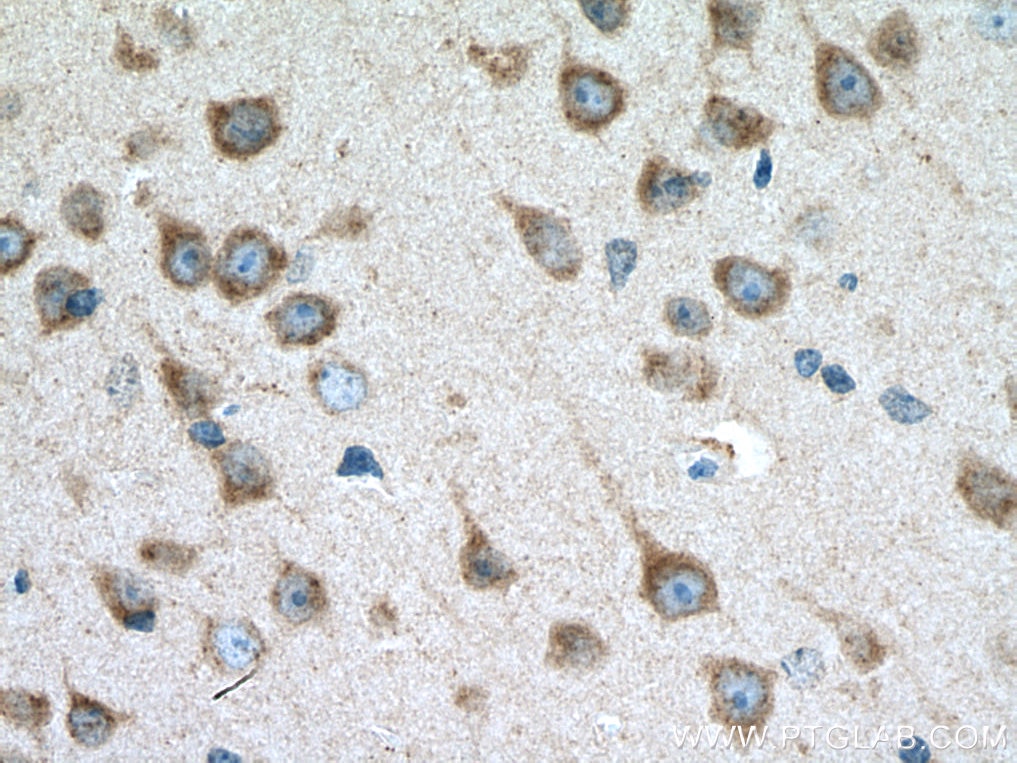Tested Applications
| Positive WB detected in | human brain tissue |
| Positive IP detected in | mouse brain tissue |
| Positive IHC detected in | mouse brain tissue Note: suggested antigen retrieval with TE buffer pH 9.0; (*) Alternatively, antigen retrieval may be performed with citrate buffer pH 6.0 |
Recommended dilution
| Application | Dilution |
|---|---|
| Western Blot (WB) | WB : 1:500-1:2400 |
| Immunoprecipitation (IP) | IP : 0.5-4.0 ug for 1.0-3.0 mg of total protein lysate |
| Immunohistochemistry (IHC) | IHC : 1:50-1:500 |
| It is recommended that this reagent should be titrated in each testing system to obtain optimal results. | |
| Sample-dependent, Check data in validation data gallery. | |
Published Applications
| WB | See 5 publications below |
| IHC | See 1 publications below |
| IF | See 2 publications below |
Product Information
12788-1-AP targets Calsyntenin-1 in WB, IHC, IF, IP, ELISA applications and shows reactivity with human, mouse, rat samples.
| Tested Reactivity | human, mouse, rat |
| Cited Reactivity | human, mouse, rat |
| Host / Isotype | Rabbit / IgG |
| Class | Polyclonal |
| Type | Antibody |
| Immunogen |
CatNo: Ag3504 Product name: Recombinant human CLSTN1 protein Source: e coli.-derived, PGEX-4T Tag: GST Domain: 29-350 aa of BC033902 Sequence: ARVNKHKPWLEPTYHGIVTENDNTVLLDPPLIALDKDAPLRFAGEICGFKIHGQNVPFDAVVVDKSTGEGVIRSKEKLDCELQKDYSFTIQAYDCGKGPDGTNVKKSHKATVHIQVNDVNEYAPVFKEKSYKATVIEGKQYDSILRVEAVDADCSPQFSQICSYEIITPDVPFTVDKDGYIKNTEKLNYGKEHQYKLTVTAYDCGKKRATEDVLVKISIKPTCTPGWQGWNNRIEYEPGTGALAVFPNIHLETCDEPVASVQATVELETSHIGKGCDRDTYSEKSLHRLCGAAAGTAELLPSPSGSLNWTMGLPTDNGHDSD Predict reactive species |
| Full Name | calsyntenin 1 |
| Calculated Molecular Weight | 109 kDa |
| Observed Molecular Weight | 109-130 kDa |
| GenBank Accession Number | BC033902 |
| Gene Symbol | Calsyntenin-1 |
| Gene ID (NCBI) | 22883 |
| RRID | AB_2229723 |
| Conjugate | Unconjugated |
| Form | Liquid |
| Purification Method | Antigen affinity purification |
| UNIPROT ID | O94985 |
| Storage Buffer | PBS with 0.02% sodium azide and 50% glycerol, pH 7.3. |
| Storage Conditions | Store at -20°C. Stable for one year after shipment. Aliquoting is unnecessary for -20oC storage. 20ul sizes contain 0.1% BSA. |
Background Information
Calsyntenins (calsyntenin-1, -2, -3) compose a family of neuronally expressed proteins that belong to the cadherin superfamily of cell adhesion molecules (PMID: 24966372; 12498782). Calsyntenin-1 (CLSTN1) is a proteolytically processed postsynaptic membrane protein with a cytoplasmic calcium-binding domain. By binding Ca2+, calsyntenin-1 may modulate Ca2+-mediated postsynaptic signals (PMID: 11161476). Calsyntenin-1 is a transmembrane cargo-docking protein for Kinesin-1-mediated vesicular transport (PMID: 16760430). It can mediate axonal transport of the amyloid precursor protein and regulate Aβ production (PMID: 22434822).
Protocols
| Product Specific Protocols | |
|---|---|
| IHC protocol for Calsyntenin-1 antibody 12788-1-AP | Download protocol |
| IP protocol for Calsyntenin-1 antibody 12788-1-AP | Download protocol |
| WB protocol for Calsyntenin-1 antibody 12788-1-AP | Download protocol |
| Standard Protocols | |
|---|---|
| Click here to view our Standard Protocols |
Publications
| Species | Application | Title |
|---|---|---|
J Neurosci The cleavage products of amyloid-beta precursor protein are sorted to distinct carrier vesicles that are independently transported within neurites. | ||
Front Oncol Long Non-coding RNA AK025387 Promotes Cell Migration and Invasion of Gastric Cancer. | ||
J Inflamm Res Unveiling the Therapeutic Potential of Berberine in Rheumatoid Arthritis: A Comprehensive Study of Network Pharmacology, Metabolomics, and Intestinal Flora | ||
J Cancer Res Clin Oncol Explore the alterations of downstream molecular pathways caused by ARID1A mutation/knockout in human endometrial cancer cells | ||
Cardiovasc Drugs Ther Calsyntenin-1 Promotes Doxorubicin-induced Dilated Cardiomyopathy in Rats |
Reviews
The reviews below have been submitted by verified Proteintech customers who received an incentive for providing their feedback.
FH Boyan (Verified Customer) (12-09-2019) | This antibody gave a clean band around 100 kD, like that is shown in its datasheet. However, in literature, people showed that this protein runs as doublet bands at 130 - 150 kD due to its glycosylation. Therefore, this antibody is highly suspicious for recognizing another protein rather than Clstn1 itself.
|










